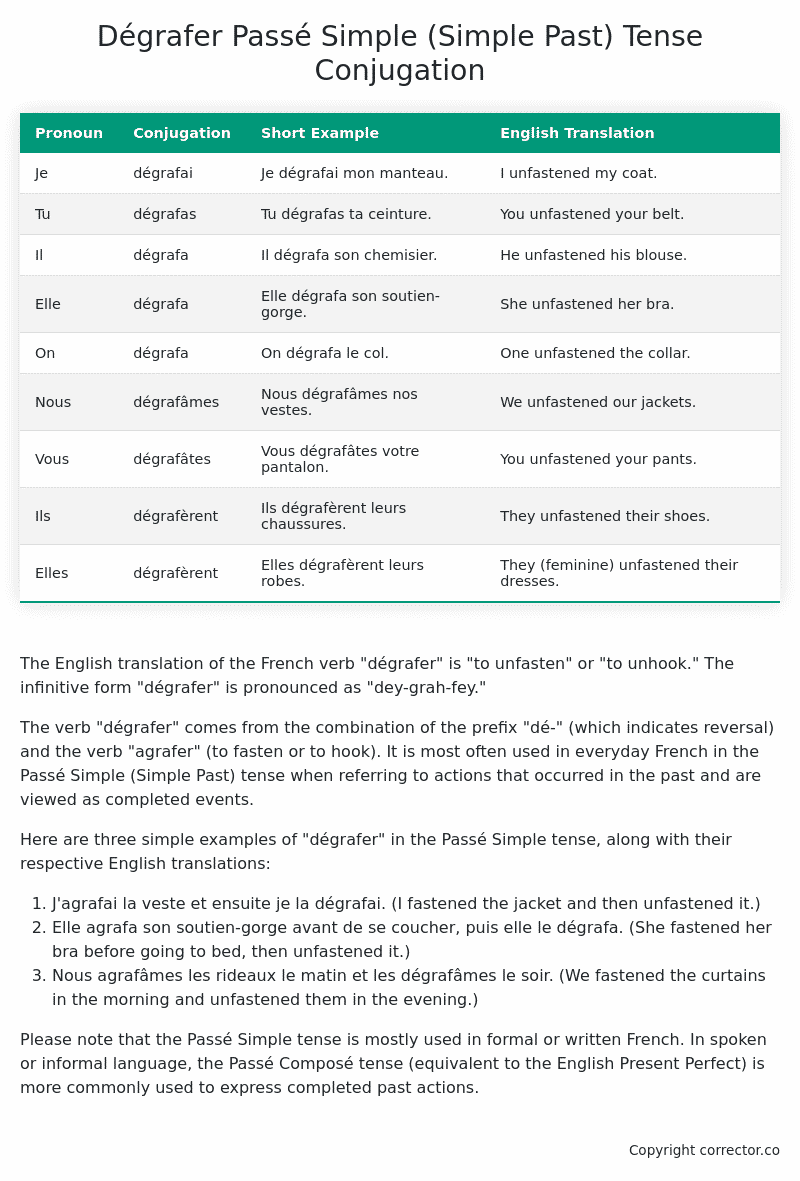Passé Simple (Simple Past) Tense Conjugation of the French Verb dégrafer
Introduction to the verb dégrafer
The English translation of the French verb “dégrafer” is “to unfasten” or “to unhook.” The infinitive form “dégrafer” is pronounced as “dey-grah-fey.”
The verb “dégrafer” comes from the combination of the prefix “dé-” (which indicates reversal) and the verb “agrafer” (to fasten or to hook). It is most often used in everyday French in the Passé Simple (Simple Past) tense when referring to actions that occurred in the past and are viewed as completed events.
Here are three simple examples of “dégrafer” in the Passé Simple tense, along with their respective English translations:
- J’agrafai la veste et ensuite je la dégrafai. (I fastened the jacket and then unfastened it.)
- Elle agrafa son soutien-gorge avant de se coucher, puis elle le dégrafa. (She fastened her bra before going to bed, then unfastened it.)
- Nous agrafâmes les rideaux le matin et les dégrafâmes le soir. (We fastened the curtains in the morning and unfastened them in the evening.)
Please note that the Passé Simple tense is mostly used in formal or written French. In spoken or informal language, the Passé Composé tense (equivalent to the English Present Perfect) is more commonly used to express completed past actions.
Table of the Passé Simple (Simple Past) Tense Conjugation of dégrafer
| Pronoun | Conjugation | Short Example | English Translation |
|---|---|---|---|
| Je | dégrafai | Je dégrafai mon manteau. | I unfastened my coat. |
| Tu | dégrafas | Tu dégrafas ta ceinture. | You unfastened your belt. |
| Il | dégrafa | Il dégrafa son chemisier. | He unfastened his blouse. |
| Elle | dégrafa | Elle dégrafa son soutien-gorge. | She unfastened her bra. |
| On | dégrafa | On dégrafa le col. | One unfastened the collar. |
| Nous | dégrafâmes | Nous dégrafâmes nos vestes. | We unfastened our jackets. |
| Vous | dégrafâtes | Vous dégrafâtes votre pantalon. | You unfastened your pants. |
| Ils | dégrafèrent | Ils dégrafèrent leurs chaussures. | They unfastened their shoes. |
| Elles | dégrafèrent | Elles dégrafèrent leurs robes. | They (feminine) unfastened their dresses. |
Other Conjugations for Dégrafer.
Le Present (Present Tense) Conjugation of the French Verb dégrafer
Imparfait (Imperfect) Tense Conjugation of the French Verb dégrafer
Passé Simple (Simple Past) Tense Conjugation of the French Verb dégrafer (You’re reading it right now!)
Passé Composé (Present Perfect) Tense Conjugation of the French Verb dégrafer
Futur Simple (Simple Future) Tense Conjugation of the French Verb dégrafer
Futur Proche (Near Future) Tense Conjugation of the French Verb dégrafer
Plus-que-parfait (Pluperfect) Tense Conjugation of the French Verb dégrafer
Passé Antérieur (Past Anterior) Tense Conjugation of the French Verb dégrafer
Futur Antérieur (Future Anterior) Tense Conjugation of the French Verb dégrafer
Subjonctif Présent (Subjunctive Present) Tense Conjugation of the French Verb dégrafer
Subjonctif Passé (Subjunctive Past) Tense Conjugation of the French Verb dégrafer
Subjonctif Imparfait (Subjunctive Imperfect) Tense Conjugation of the French Verb dégrafer
Subjonctif Plus-que-parfait (Subjunctive Pluperfect) Tense Conjugation of the French Verb dégrafer
Conditionnel Présent (Conditional Present) Tense Conjugation of the French Verb dégrafer
Conditionnel Passé (Conditional Past) Tense Conjugation of the French Verb dégrafer
Conditionnel Passé II (Conditional Past II) Tense Conjugation of the French Verb dégrafer
L’impératif Présent (Imperative Present) Tense Conjugation of the French Verb dégrafer
L’impératif Passé (Imperative Past) Tense Conjugation of the French Verb dégrafer
L’infinitif Présent (Infinitive Present) Tense Conjugation of the French Verb dégrafer
L’infinitif Passé (Infinitive Past) Tense Conjugation of the French Verb dégrafer
Le Participe Présent (Present Participle) Tense Conjugation of the French Verb dégrafer
Le Participe Passé (Past Participle) Tense Conjugation of the French Verb dégrafer
Struggling with French verbs or the language in general? Why not use our free French Grammar Checker – no registration required!
Get a FREE Download Study Sheet of this Conjugation 🔥
Simply right click the image below, click “save image” and get your free reference for the dégrafer Passé Simple tense conjugation!

Dégrafer – About the French Passé Simple (Simple Past) Tense
Formation
Usage
Narration
Historical Context
Interactions with other tenses
Passé Composé
Imparfait
Conditional and Subjunctive
Summary
I hope you enjoyed this article on the verb dégrafer. Still in a learning mood? Check out another TOTALLY random French verb conjugation!


